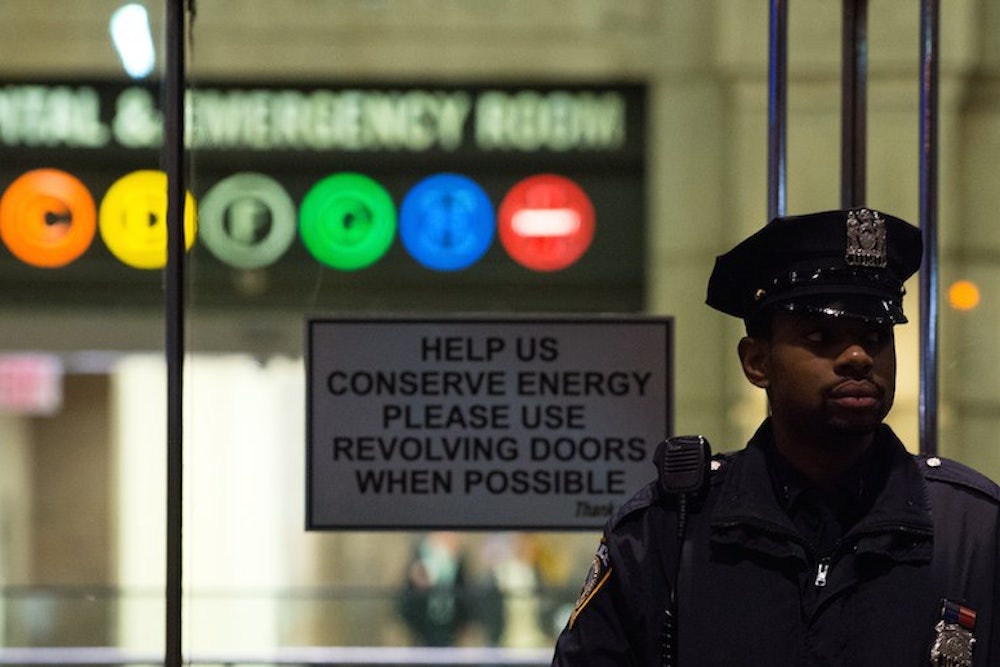A fourth person has been diagnosed with Ebola in the U.S. This time it’s in New York City and the patient is a 33-year-old physician who recently returned from West Africa, where he was taking care of Ebola patients for Doctors Without Borders.
Here’s what we (think we) know, via media reports and statements from federal, state, and local officials:
The physician, Craig Spencer, returned from Guinea six days ago. He went through enhanced screening at JFK Airport, answering questions about his work and exposure truthfully, and began a regimen of “self-monitoring”—that is, checking his temperature twice a day. He “self-isolated” and “limited his contact with people,” according to Mary Bassett, public health commissioner in New York City. And on Tuesday he started feeling a little sluggish. But he went about his life and, on Wednesday, he visited the Gutter, a bowling alley in Brooklyn. He took the “1”, the “A,” and the “L” subway lines to get there—and returned via Uber car service.
It was on Thursday morning he spiked a fever, reportedly of 103 degrees. At that point, according to the New York Times, he contacted Doctors Without Borders—which, in turn, contacted the New York Department of Health. Rescue workers in special protective gear went to his apartment and promptly transported him to a special isolation unit at Bellvue Hospital, where he remains now. An initial Ebola test, analyzed by the New York City health department, turned up postiive. The CDC has yet to confirm the result, but officials assume they will.
There’s no word yet on Spencer’s condition, although the Times quoted a hospital source saying he seemed “very sick.” The fact that Spencer was outside and using public transportation, while he was sluggish and the virus was incubating, is sure to alarm people. But Ebola is not airbone: You can’t get it without coming into contact with bodily fluids, from somebody who is symptomatic: That’s why two nurses caring for Duncan contracted Ebola, but family members who had been with him before he got very sick did not.
If Spencer truly had no fever or other obvious signs of the disease until Thursday, experts reaffirmed to me tonight, then it’s highly unlikely he infected others on Wednesday.
Here’s Melinda Moore, an infectious disease specialist who used to work at CDC and now does public health work at the RAND Corporation:
The sluggishness may or may not be Ebola related, but even if it were, the type of contact anyone on public transportation with him might have had should pose negligible risk. Truly.
Here’s Howard Markel, the pediatrician, past consultant to CDC, and historian of epidemics at the Univeristy of Michigan:
Chances are very low. Sweat shouldn't have that much virus at that point. It's really when you start to vomit and have copious diarrhea that the virus has multiplied so much to make you both sick and contagious.
And here’s one more infectious disease specialist I know and trust (but who asked to remain anonymous, because of his employment):
The subway should be minimal to no risk—but people will worry anyway. I wouldn't want to be an E.R. doc in New York tonight or tomorrow!
That's true and it raises an important point. Soothing public anxiety is a legitimate public health measure—and panic is a real public health problem. Many people are going to ask why a doctor who was treating Ebola patients, in Africa, wasn’t in some kind of formal quarantine. Over the last few days, he's had contact with at least four people—his fiancée, two friends, and the Uber driver. All of these people are healthy, Bassett said, but they are being quarantined and monitored.
Experts noted that Bellevue and the New York City Health Department are particularly well-equipped to handle this kind of situation. In addition, CDC has dispatched a "go" team of advisers and clinicians, although some were already in New York anyway. They will not simply track down possible contacts, as they did in Dallas. They will also help health care workers avoid infection, which they did not do in Dallas. That's important, because the biggest threat right now almost surely isn't to subway riders or bowlers. It's the public health workers who will be taking care of Spencer.
